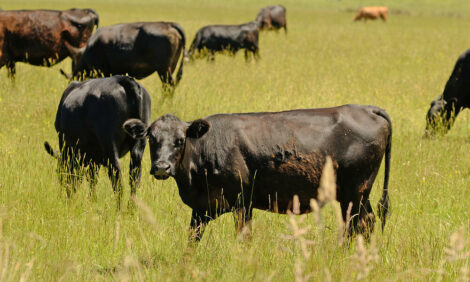



Global View Required For Beef Industry Today
US – Beef producers should think globally when considering their future, a leading Washington insider told cattle producers at the Cattle Industry Summer Conference in Denver, Colorado.Jim Wiesemeyer, vice president, policy and trade issues, for Informa Economics Inc., told about 700 producers at the opening session that exports are "going to be your margins in the future. That is your growth market".
He noted beef exports in May were up 32 per cent over last year, and were the largest since 2003. The industry has momentum, he says, through the new managed trade agreement with South Korea.
"Hopefully, Japan will come along," he said.
* "The industry has been very innovative especially as we go through this economic downturn." |
|
Jim Wiesemeyer, vice president, policy and trade issues, for Informa Economics Inc.
|
"With their rise to afford your product comes their ability to trade," he said.
"We have spent every year since the end of World War II trying to convince (them) to get good banking systems, to become competitive, to improve their nation's diets. You have, and we have, succeeded in globalizing the world."
Globally, those producing protein are definitely in a growth market, Wiesemeyer said. He noted the United States has not necessarily globalized itself. Failure to get more trade is a negative for beef producers, he said, and "that’s a challenge to your group".
Also speaking on the panel discussion, moderated by Orion Samuelson, agribusiness director of WGN Radio in Chicago, Illinois, was Barry Flinchbaugh, professor of agriculture economics at Kansas State University. Flinchbaugh said producers should keep their sense of humor and remember their history. The economy has been in worse shape than it is now, he said.
"Sure, we've got problems," Flinchbaugh said.
"But historically speaking, they're relatively minor. And we have tools at our disposal that we didn't have decades ago to handle this."
He said basic fundamentals in the economy are still solid, pointing out that in 1980 the interest rate was 22 per cent and inflation was 13 per cent, while today both are sitting around five per cent.
"Frankly, it's not the economy, it's politics," Flinchbaugh said.
"And we're in the middle of silly season."
Wiesemeyer applauded the beef industry for its focus on new and innovative products, saying these new items have helped move the industry forward significantly.
"Keep working on expanding the use of beef value cuts," he said.
"Your industry has been very innovative especially as we go through this economic downturn."
Speaking about the industry's Flat Iron Steak, developed as a result of cattle producer dollars through the Beef Checkoff Program, Wiesemeyer said the industry had done a good job.
"You’ve got a good product at the right time," he said.
Although Flinchbaugh said it would not do what some producers think it will do, both panelists agreed the Country of Origin Labeling program will work better as a result of changes insisted on by the National Cattlemen's Beef Association.
"As a result of your efforts, it will be implemented much better," said Wiesemeyer.
Under questioning, both panelists weighed in on the presidential candidates and what their positions would be on agricultural issues. Both Wiesemeyer and Flinchbaugh agreed that neither candidate understood or appreciated agricultural issues to a degree that would please most farmers and ranchers.
More than 800 producers are attending the 2008 Cattle Industry Summer Conference in Denver, the industry's mid-year meeting at which NCBA policy is reviewed and directed. In addition, at this meeting beef checkoff programs for fiscal year 2009, which begin 1 October, are reviewed by committees and recommended for funding.
TheCattleSite News Desk


